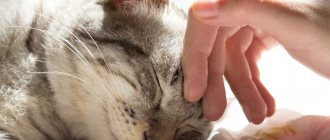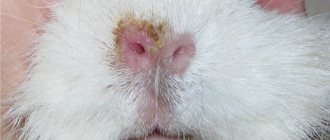There are a large number of different diseases, the phenomenon of many of which the owners cannot explain on their own. They start digging on the Internet, looking for information and trying to treat the disease on their own.
The reasons why a cat sneezes and coughs are very different. It happens that it is just a simple cold, in which there is nothing wrong. However, more serious illnesses also occur: of the heart, blood vessels, and respiratory tract. It could also be a serious infection or respiratory illness. In this article we will look at the main diseases that are associated with sneezing and coughing in cats, and we will also look at treatment and prevention. The most important thing is that only a veterinarian is able to diagnose the disease and prescribe the right course of treatment that can return the animal to its usual way of life.
However, bringing a cat to a veterinary center on your own can be dangerous, because the pet experiences stress and anxiety, which often only intensifies and increases the danger of the disease. The kitten is afraid of new places, so it is better to call a veterinarian from our veterinary center. Thanks to several reference points in Moscow and the Moscow region, the doctor will arrive within 40 minutes after the call. He brings everything he needs with him, so if, for example, an analysis is needed, the owner will receive the result using the express method in 15 minutes.
Why does a cat sneeze and cough?
Ideally, this method of exhaling oxygen and air in animals and people protects them from suffocation if some object, water, or irritating substances in the form of, for example, smoke or gases get in the way. The cat coughs if cigarettes or hookah are smoked in his presence. Often pets are generally allergic to smoky impurities. Also, if there was inflammation in the lungs, by coughing the body gets rid of accumulated inflammation and tries to cough it up. This works for all living beings, including humans. If a cat coughs, it will usually stretch its neck.
If a cat is coughing , then it is obvious that something is wrong with him.
This is a “good” symptom for a veterinarian, because by coughing he often determines what the problem is and then proceeds with a detailed diagnosis of the selected area. Sometimes it is the respiratory tract, sometimes the heart and blood vessels.
State Description
A cough with wheezing is a situation when you should worry about the health of your pet. The attack is often accompanied by the release of sputum and mucus, the sound when the pet coughs and wheezes is low and muffled, and the duration can be different each time. No wheezing is heard during coughing, since this symptom accompanies the cat almost the entire remaining time.
Wheezing in the sternum area can be easily heard, because it is the respiratory tract that is affected by a disease that causes coughing and wheezing.
Wheezing can be heard when your cat is panting, eating or drinking. They do not stop during sleep, but more often turn into snoring or snoring. Loud snoring during sleep indicates a severe problem in the respiratory tract. Snoring is often accompanied by discharge from the nose, eyes, and swelling. These are all serious symptoms.
Specifics of cough
In the cat family, unlike dogs, coughing rarely occurs. Even if the disease is similar in a dog and a cat, and this occurs often, the cat only wheezes or suffers from shortness of breath , sometimes it simply has difficulty breathing. While the dog has a cough. Often the disease itself is determined by its sounds, and it’s only a matter of detailed diagnosis. For example, if a cat has inflamed pleura and lungs, pneumonia or heart problems, then most likely she will pant and wheeze. They will not cough because they themselves avoid it. Pets become less mobile, do not play, do not show emotions, do not meow or make sounds. Often they simply hide in a secluded place in one position or ventilate near a window or balcony to make breathing easier.
If such behavior is noticed in a pet, then this is already a signal to sound the alarm and call a doctor at home. Just call, because in this state the cat will not want to go to a new place in the clinic. He will only become stressed and the situation will get worse. The disease will also begin to progress. It is better to show the doctor how the cat behaves at the site of the disease. Only in this way will the doctor diagnose the disease correctly and apply a course of treatment.
Sometimes a cat sneezes and coughs at the same time . This usually happens with allergic reactions. A cat can be allergic to anything: from dust and some particles and microorganisms in the house to new litter or even food. If a cat rubs its nose and sneezes , then this is another proof that it has an allergy.
Main provocateurs
There are a number of pathologies that also provoke coughing in cats , for example:
- a foreign body has entered the respiratory tract;
- heart problem and vascular problem;
- oncology that develops in the animal’s chest;
- pneumonia is also a dangerous disease that progresses, develops and causes severe coughing attacks even in a cat that rarely coughs on its own;
- pneumothorax or hydrothorax - accumulation of air or fluid in the chest of an animal, respectively;
- an organ from the abdominal cavity enters the chest, this happens when a loop of intestine gets there and causes discomfort;
- cats have worms, which also cause;
- developing rhinotracheitis in cats;
- some others.
It is clear that this is not the entire list that causes coughing in pets. A cat's cough is a symptom of about fifty or even hundreds of diseases. However, if the pet coughs, then they say with confidence that the pet is sick. It is only important not to diagnose yourself and not take any measures to treat your pet and entrust this matter to an experienced veterinarian.
Major diseases
Below we list the main diseases that cause cough. They are the ones that should be monitored more often, because according to statistics, if a pet coughs, it is for one of these reasons, and not for some rare reason. Also, in each specific example, treatment methods will be considered, because they are individual and vary greatly from cause to cause.
Bronchial asthma in cats
The disease bronchial asthma , which often affects not only people, but also our smaller brothers. Asthma causes cats to experience mild to severe bouts of coughing and hoarseness. When severe, the cat can cough, wheeze and breathe heavily, without stopping for a minute, which greatly torments and torments the animal. The cat also sneezes, often without stopping. The cause of asthma is the same as in humans, for example, physical activity, anxiety, the surrounding atmosphere and much more.
Young kittens often suffer from bronchial asthma.
, sometimes the age reaches 3 years. If we talk about the breed, then these are Siamese cats. Problems occur in autumn and spring, just like in humans. Everything depends on the disease itself.
The disease is long and difficult to treat; bronchodilators and medications are prescribed, which are given to the pet in the form of tablets or injections.
Viral rhinotracheitis in cats
Often during an illness, viral rhinotracheitis in cats also causes sneezing, tears, diarrhea, snot and other similar signs. The nose is always wet. The symptoms are the same as influenza in humans, but cats have their own version of the flu. The symptoms there are completely identical to those of humans: coughing, sneezing, runny nose, etc. The disease is also contagious.
It is better to vaccinate and inoculate your pet in advance than to treat the disease. After all, the treatment itself is complex and long. It is prescribed depending on each specific situation by the doctor.
In our veterinary center, a veterinarian is ready to respond to a call within 40 minutes, 24 hours a day, seven days a week. This is beneficial for the animal, because the cat does not leave its usual habitat, which means it worries and worries less. The doctor will examine the cat and diagnose the disease, at the same time prescribe a course of treatment and tell you in detail about the specifics of the treatment. Working with modern analytical methods and European technologies serves as a guarantee of the quality of our clinic.
"Battle" wounds in cats
If during a fight, bruise or bite a pet's trachea is damaged, then the cough is provoked on its own without any illness. At the same time, the cat loses its appetite and desire to play, complete apathy and indifference appear. Treatment here is based on specific injuries and bruises. It is important not to let the injury fester and also to prevent internal bleeding.
Worms in a cat
This is a separate and very big problem that owners all over the world face. Worms can easily cause severe coughing in cats ; moreover, cats of any age and of any gender are susceptible to the disease. Infection occurs even if the pet has not left the walls of the house and has not communicated with other pets.
Helminths are the most common type of worms that settle in the gastrointestinal tract of a pet. It is advisable to treat the disease at the earliest stages, because otherwise it is very difficult to remove worms from the body. The number of parasites quickly reaches a critical point, which means that over time they enter the stomach and from there enter the external environment through the pet’s vomit. Actually, the cough here occurs precisely because of the urge to vomit, which occurs rarely.
Also, parasites and their larvae penetrate the pet’s circulatory system, enter the lungs, trachea and bronchi, from where it is even more difficult to remove them. In this case, the cough is frequent, but short-lived and moderate.
Cardiac cough in cats
It often happens that heart disease in cats causes coughing , and this happens in dogs and cats. Such a diagnosis is difficult to make, because it requires professional equipment, for example, an electrocardiogram, radiography, echocardiography. Treatment is individual and should be checked with your veterinarian separately.
How to treat?
Even if the owner is sure that the cat is sneezing and coughing due to, for example, bronchitis or another cold, it is absolutely impossible and should not treat the pet yourself
. All medications and treatment methods can only be prescribed by the veterinarian who diagnosed the disease. There is a risk of taking the medicine for too long, which will only worsen allergies or any other illness. There is also a risk of overdoing the dosage of the drug or simply not using it correctly. After all, many cats have personal intolerance to certain substances and medications.
If we talk about how a doctor treats, then this is a mandatory diagnosis using various express tests, prescribing a course of medications in accordance with personal intolerance to drugs and some characteristics of the animal’s body.
How long to treat if the cat is sneezing and coughing?
If it is a cold or a disease in the bronchi, then it is treated for about a week or a little more. If there is an allergy, it often does not go away throughout the animal’s life or is treated over a long period of time. If the problem is with worms, then everything is individual, because it is quite possible that the worms have spread throughout the body, including the lungs. Then the disease is much more difficult to treat.
It is important to remember that cough is not the disease itself, but only a symptom that means hundreds of different scenarios, and only an experienced veterinarian can tell what the problem is and how to treat it. Our medical center provides the services of veterinarians who diagnose the disease using modern techniques at home on call. They arrive within 40 minutes after the call, and the pet owner finds out the price over the phone.
Diagnostics
Cough is a symptom of abnormalities in your pet’s health, and not a separate disease. It is very important to correctly diagnose and find out the cause of the cough. Only a veterinary specialist can do this, because... In total, there are more than 50 types of diseases associated with this clinic.
Diagnosis of diseases accompanied by cough spasm is a labor-intensive and sometimes quite lengthy process. Often, until the exact cause is determined, the cat will be prescribed symptomatic medications to simply alleviate the condition.
To make a diagnosis, a veterinarian:
- collects anamnesis by conducting a detailed interview with the patient's owner;
- examines the animal as a whole, and also pays special attention to the upper and lower respiratory tract, conducts auscultation of the lungs and trachea (listens for the presence of wheezing and noise);
- listens to the work of the heart;
- if necessary, takes an x-ray and takes blood for tests;
- if there is a suspicion of pathology of certain respiratory organs, prescribe x-ray contrast studies;
- culture secretions from the pharynx or sputum to identify potential causative agents of the inflammatory process and determine their resistance to various antibiotics and antimicrobials;
- if oncology is suspected, a biopsy of the organ where the lesion is suspected is performed;
- in some clinical cases, it is possible to schedule additional consultations with a veterinary cardiologist, oncologist, surgeon and allergist.
We recommend reading: Resflor - instructions for use for cattle
Why does a cat cough and sneeze? Let’s look at the main reasons
The reasons that a cat sneezes are no less than the reasons for coughing. Treatment also depends on the cause of the disease. So, if it is a fungus, then drugs are used against it. If a foreign body is stuck in the nose or trachea, the doctor must remove it. And so on for each disease.
Here we will look at the main causes and methods of treating them, however, the information is for informational purposes only and it is strictly not recommended to treat your pet on your own.
Upper respiratory tract infections in cats
It is upper respiratory tract infections in cats that become the most common cause of sneezing in cats. There are different types of infections: fungus, bacteria and viruses. The symptoms are approximately the same:
- Kitten sneezes
- Coughs often
- His nose is wet
- Eyes with tears
Allergies in cats
As already mentioned, cats suffer from allergies no less than people. The reasons are the same as for people: dust, strong smoke from cigarettes or hookahs, pollen and flowering, various powders, new tray fillers, the smell of food, air fresheners, etc. In such cases, the cat rubs its nose on the surface, as well as with its paws. A cat sneezes only when it is in an allergenic environment; its nose also becomes wet and a runny nose appears. The pet wants to quickly run away from the place where the attacks began.
If you are allergic only to the litter for the tray, then you just need to change it and the allergy will go away, you don’t need to do anything else. If some allergen gets stuck in the pathways and causes discomfort for a long time, you need to consult a doctor for help. It is also worth noting that the exacerbation begins during flowering periods in the spring and sometimes in the fall, so it is enough just to survive short periods of time and suffer a sneeze, but then it will all end and the cat will feel good.
Asthma in cats
Cats also have asthma. A few words have already been said about it, but in some cases the pet coughs, and in others it sneezes. They are treated approximately the same. The cause of the disease is a long interaction with the allergen, which caused sneezing and now continues to do so on a constant and almost chronic basis. They are often treated with warm steam, which the pet inhales. This helps clear the bronchi of excess.
Heartworms in cats
As you know, mosquitoes are carriers of bacteria and diseases; just remember malaria in Africa. However, not everyone knows that mosquitoes can infect a cat with a simple bite. Microscopic larvae enter the body through the insect's proboscis. Through blood vessels and pathways they enter the heart, or more precisely, into its right chambers. The nearby pulmonary and cardiac arteries are affected, the worms become clogged and make breathing difficult, causing the pet to sneeze. If he sneezes frequently, the arteries become clogged and sometimes a heart attack occurs. The main symptoms here are the cat's sneezing and coughing.
Only a veterinarian who has already encountered a similar problem should treat a pet in such a situation. You can’t ignore it and you also can’t advise anything, because the case is serious and requires equally serious intervention from a specialist. It is better, of course, to carry out preventive procedures to avoid infection in principle.
Dental problems in cats
Sometimes it happens. Yes, this is rare, but if there are any problems with the teeth (smell from the mouth, suppuration, gum disease). The infection that struck and caused these causes also reaches the respiratory tract, which leads to sneezing. This happens to kittens that are still weak and their immunity is susceptible to attack.











